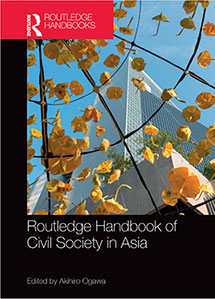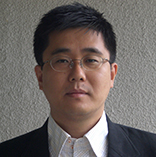Launch of Routledge Handbook of Civil Society in Asia An Interview with Akihiro Ogawa, Editor of the Handbook and Professor of Japanese Studies, Asia Institute, University of Melbourne
IPS Researchers, Dr Gillian Koh and Ms Debbie Soon recently published a chapter on civil society in Singapore in the Routledge Handbook of Civil Society in Asia (2017). IPS Update interviews Dr Akihiro Ogawa, Professor of Japanese Studies, Asia Institute, University of Melbourne who edited this special volume.
 For the man-in-the-street, what is important about scholarship on civil society in Asia?
For the man-in-the-street, what is important about scholarship on civil society in Asia?
Civil society is an arena where grassroots people have access to public affairs. If we understand how civil society functions in our society, we will also understand whether citizens have access to politics; to shape governance. Actually this was my starting point for studying civil society almost two decades ago.
Since then, as a scholar, I have been arguing that civil society needs to be re-conceptualised from its Eurocentric origins as the idea often refers to a particular set of relationships between the state and individuals in the West. We know that each society moulds its own version of civil society, reflecting social relationships arising out of specific experiences.
The number of studies on civil society in Asia lags behind the abundant studies on the interconnections between economic and political spheres in the region, which provide evidence of deepening ties and interdependencies within Asia over recent decades. I believe the authors of the
Handbook provide a good start for all of us to understand civil society in Asia.
For you, what are the qualities about civil society in Asia that struck you when you were editing
Handbook?
 I was impressed with the level of hybridity observed in civil society in Asia. The
Handbookcaptures three major frameworks for understanding civil society in contemporary Asia: first, the dynamism of state-society relations; second, the emerging civil society under authoritarian rule; and third, social movements—transnational activism and networking for integrating grassroots people in Asian societies. To capture the dynamic nature of this sector in Asia, the academic disciplines need to come together to analyse civil society and its internal dynamics in the context of different cultures and histories. Doing so might yield a more holistic understanding of Asian civil society. So that is the first unique feature of this publication – its multidisciplinary approach.
I was impressed with the level of hybridity observed in civil society in Asia. The
Handbookcaptures three major frameworks for understanding civil society in contemporary Asia: first, the dynamism of state-society relations; second, the emerging civil society under authoritarian rule; and third, social movements—transnational activism and networking for integrating grassroots people in Asian societies. To capture the dynamic nature of this sector in Asia, the academic disciplines need to come together to analyse civil society and its internal dynamics in the context of different cultures and histories. Doing so might yield a more holistic understanding of Asian civil society. So that is the first unique feature of this publication – its multidisciplinary approach.
Another important feature of this
Handbook is its attempt to present local voices as much as possible. Whereas Asia has often been seen through a Western filter, as the editor, I intentionally picked, as much as possible, local scholars and practitioners who could write in English simply because their voices are underrepresented in the international scholarship on Asian civil society. I also included scholars and practitioners from North America, Europe, and Australia who have conducted long-term field research in Asian societies, deeply immersing themselves in local people’s daily lives. Of the 40 contributors to this book, 24 (the majority) are Asians, and the other 16 scholars are Westerners. Hence, this
Handbook creates a unique, balanced space for discussion about Asian civil society.
What stood out for you in the chapter on civil society in Singapore, written by IPS’ Gillian Koh and Debbie Soon?
It was very interesting that Gillian and Debbie examine civil society in Singapore under what scholars call “an electoral authoritarian regime.” Their chapter plays a key role in understanding the emerging civil society under authoritarian rule – the second framework I proposed to understand civil society in Asia. I enjoyed reading the active interactions between the strong state and grassroots individuals, the latter tactically choosing “non-confrontational strategies.” Furthermore, their chapter also addresses transnational exchanges and networks via the Internet. In Asia, such transnational exchanges and networks have been active but understudied, in particular, the role of media in moulding civil society. When the new media starts revealing their potential in terms of global outreach and accessibility, the Internet can become a powerful defender of civil society.
What are the key political developments in Singapore or maybe even the rest of Asia that you will be looking out over the next decade?
Well, I would like to locate the development of civil society in Singapore in comparative works. One of the major issues raised for future research relates to the dearth of comparative work in the Asian civil society scholarship, including that which relates to democracy and authoritarianism. Singapore would be an important case study for this effort. Comparative studies based on a thematic analysis of democracy and authoritarianism are crucial to understanding the significance of what is observed in country case studies to identify cross-national commonalities and divergences, which are nevertheless informed by a deep understanding of the relevant context. I would like to say that case studies can be carefully developed to enhance and extend existing scholarship by the deployment of a strong comparative perspective that has been missing in much of the analysis on civil society, democracy, and authoritarianism in Asia.
Please use this link for more information and to get a discount to purchase this Handbook by Routledge.